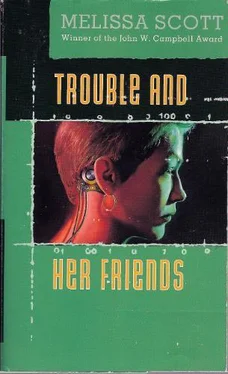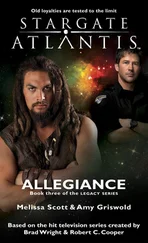“You touch me,” Cerise said, “and I’ll fucking kill you.”
She hadn’t spoken loudly, sounded calmer than she felt, but the girl heard, eyes widening so that a tear ran down her painted face, drawing a long line of scarlet from her mascara. Cerise lifted her, barely feeling the effort, and let her go again, saw her slide gracelessly to the bottom of the wall and sit for an instant, long legs sprawling, before the other girl moved to help her up. Cerise turned her back on them, not caring, daring them, even, to follow her. There was nothing, not even a catcall, last defiance, and she felt the sharp sting of regret before the reaction set in.
She was still shaking a little, adrenaline-anger and fear mixed, when she turned down the narrow street that led to Marco Polo’s and pushed open the door badged with a neon cactus and pagodas, wincing as the twanging steel-string music hit her like a blow. The downstairs room was filled with a mix of suits and lower-level tech-types and a fair number of secretaries and temps of both sexes on the hustle. Most of them were standing four-deep at the bar, bellowing indistinguishable orders at the sweating bartenders, or crowded in groups of six or seven around the tiny tables. A few, maybe a dozen or so, were already on the little dance floor, arms linked across each others’ shoulders, feet moving in approximate coordination. Twin television monitors hung at the ends of the bar, and the news anchor beamed down like a benevolent deity. His words were inaudible through the music and the shouted conversations, but the logo beside his head was the familiar computer-chip-and-gavel that had come to stand for Evans-Tindale. Cerise made a face, seeing that, and began to work her way through the crowd toward the stairs that led to the upper bar.
It was a jovial crowd, this early, everybody loose but not yet drunk enough to think of trouble, and it wasn’t difficult to get through the mob, no need to resort to elbows or stepping on toes. She smiled mechanically at suits, and they edged smiling away, letting her worm through the spaces. She fetched up at the foot of the stairs in a sudden pocket of silence as the song ended, and stood there for a moment catching her breath, looking back toward the monitors. The Evans-Tindale logo was still in place, though the image behind it had changed: the screen was filled with protesters, all waving placards that called for the U.S. to sign the Amsterdam Conventions. The camera focused on one sign, carried by a black woman who looked young and serious enough to be a student at a real college; it read, in bright red letters, A: U.S. AND LIBERIA. Q: WHO HASN’T SIGNED? That wasn’t quite true, Cerise thought—she vaguely remembered that there were a couple of Asian nations that hadn’t yet agreed to the Conventions—but it was close enough. At her side, a tallish suit, good-looking, broad bones and a not-too-neat mustache, shook his head.
“I don’t get it,” he said, to no one in particular. “What’s the problem?”
Cerise looked at him in disbelief, wanting to say something but not knowing where to begin. Evans-Tindale was going to change everything, was going to destroy the nets as they were, and offered nothing to replace them— A suited woman edged up to the man, handed him one of the two beers she carried, holding them well away from her body.
“Technics,” she said. “If they can’t have their toys—”
The music started again, with a wail of synthetic brass, drowning out her words. Cerise shook herself—there was nothing you could say to some people, nothing that would make any difference—and started up the stairs.
The upstairs room—it had never had another name, wasn’t even officially reserved for a netwalker clientele, though the occasional suit or temp who wandered in from downstairs usually left quickly enough—was much quieter, and she let the heavy door thump shut again behind her with a sigh of relief. There was no music here, just the occasional murmur of voices and the overlapping noise of five or six television monitors, each tuned to a different channel. Most of the little tables scattered across the dimly lit room were occupied by netwalkers who sat alone or in twos and threes, muttering together or with their eyes fixed on the monitors mounted from the ceiling. She recognized some of the faces—Johnny Winchester, for one, scrawny and greying, who had been on the nets since the invention of the dollie-slot, and was syscop, the on-line legal authority, for one of the official public spaces. He’d been to D.C. four times to testify, supporting the Amsterdam Conventions, had argued at the last that Evans-Tindale was better than nothing. I hope you’re satisfied, Cerise thought, and headed for the bar, giving his table a wide berth.
The bar itself was mechanical, which meant a limited selection of drinks, but Marco didn’t have to pay a fifth bartender. Cerise fed a couple of slips of citiscrip into the machine, and it whirred to itself for a moment before filling a plastic cup with wine. In the dim light it looked more like water, and she sniffed it to be sure before she turned away. There were a few other faces she knew, not many: netwalkers didn’t as a rule congregate in the real world. It took something like this to bring them together, and even then most of them weren’t talking to each other, just sitting and listening to the monitors. She recognized a pair of women from the Arts Round Table, sitting together with a man she didn’t know. All three looked grim, and they had their heads close together; as she made her way past the table, she saw that they had a portable machine set up, and were staring avidly at its screen. Neither of the women were on-line, and the man didn’t even seem to have a dollie-slot; what good they thought they could do, she didn’t know. There was another familiar shape at a table at the back of the room, a rangy man, bearded and scowling, a flashing pin in the shape of his red-hand icon fastened to the lapel of his neat suit-jacket, and Cerise looked hastily away. Bran-Boru, or whatever his real name was, had a reputation for being chancy, and she had no desire to attract his attention.
Then at last she saw van Liesvelt, skinny and blonde and rumpled, even sitting down taller than the others at the corner table. He lifted his hand in greeting, beckoning her over; Cerise waved back, not trying to hide her relief, and came to join them. The others were there, too: Carlie Held still in working whites under his grubby jacket, Arabesque slowly crumpling the fingers of a VR glove—the old-fashioned virtual-reality interface, not good for anything but games and blunt-instrument science anymore—into an ungainly fist, Max Helling with his partner Jannick Aledort at his back, Aledort listening, not quite part of the group, while Helling talked. Max was always talking, Cerise thought, and took the last chair, next to Dewildah Mason, who looked up at her with a wry smile and a nod of greeting.
“So where’s your other half?”
“Trouble’s gone,” Cerise said, and to her horror heard her voice crack. She took a sip of the wine to cover it, swallowed wrong, and choked. Mason reached over to pound her on the back, brown eyes wide with concern.
“That’s what you said,” van Liesvelt said.
Giving me time to pull myself together, Cerise thought, and nodded her thanks, setting the wine down again.
“Yeah.” Her voice was still strained, and her throat hurt, but at least she didn’t sound as though she were going to cry.
“Evans-Tindale?” Helling asked. He was a thin, feral-looking man, a little older than the rest of them. He’d been on the net for years, had more business connections in the shadows, knew more about buying or selling black-market programs and data than any of the others. Cerise sometimes thought he only stayed friends with them because they were all queer, and the old-style netwalkers still didn’t approve of him, wouldn’t approve of him no matter how good he was because of it. She suspected he’d taken the risk of the brainworm for the same reason: the old-style netwalkers wouldn’t respect his work once he’d gotten it, but then, they hadn’t ever respected him. The brainworm did give you an advantage on the nets, let you use the full range of your senses, not just sight and sound, to interpret the virtual world. The old-style netwalkers claimed to hold it in contempt, said that it was a crutch, something for second-raters, but Cerise suspected, had always suspected, that they were just afraid. The worm entailed risks: implantation and direct-to-brain wiring was always tricky, could leave you a mental cripple if the operation went wrong, and the oldsters had never quite been able to face that possibility. The dollie-slots and the associated implants didn’t touch the brain, ran along existing nerves—less of a risk, and more of a challenge to use, or so the oldsters said.
Читать дальше












